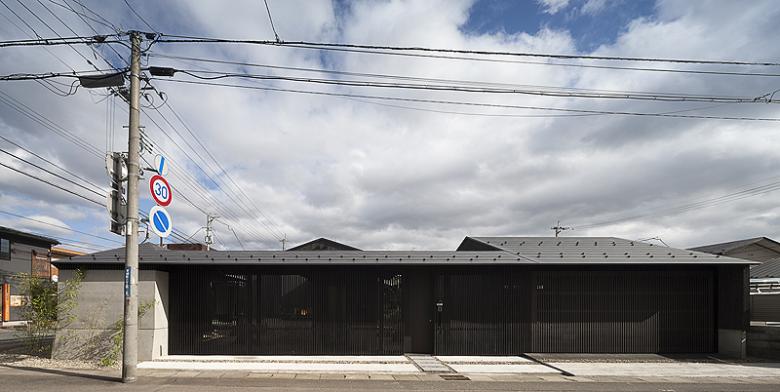Spaced Apart
Spaced Apart
Architect Kazuhiko Kishimoto of the Kanagawa-based firm acaa designed this wood-framed ranch-style home in the snowy city of Kitakami, Iwate Prefecture. In order to adapt the home to the region’s harsh winter climate, Kishimoto says he took particular care in designing the structure and detailing of the roof and foundation. He also treated the two-meter-high exterior wall as a carefully designed architectural element so that the wall, which was necessary on the corner lot for security reasons, did not become an eyesore in the neighborhood. These measures earned the home a prize from the city for contributing positively to the urban landscape. Creating a comfortable interior was also important given the long hours spent inside during winter. The design features multiple living spaces and an interlinked layout that creates the sense that one is taking a stroll from one room to the next. We asked Kishimoto about the project.
Approach viewed from the street
Exterior viewed from the street
Please give us an overview of the project.
The lot faces an intersection on the outskirts of a provincial city. Because the neighborhood comprises a mix of multiuse buildings, restaurants, bars, and homes, identifying elements of the streetscape that merited preservation was challenging. Rather, in this project we felt it was important to offer a new sense of beauty and harmony to the existing streetscape.
Japanese-style room 1 viewed from courtyard
What did you learn from this project? What will you take from it to future projects?
Our objective of evoking the beauty of traditional Japanese architecture by incorporating delicate detailing on the tips of the eaves and making them as thin as possible conflicted with our other goal of ensuring the eaves were durable so they would stand up to the snow. By consulting extensively with the building contractors, I think we achieved an optimal balance between these two goals.
Courtyard
What was most important for you during the design process?
By reducing the height of the structure, we attempted to create an elegantly proportioned exterior with a human scale. The interior, too, consists of compact, human-scale spaces linked together in a staggered sequence. Our goals were to achieve a wandering circulation and a diversity of views onto the courtyard.
Japanese-style room 2 viewed from courtyard
What challenges did you face in the project? How did you respond to them?
Because the building is located in a region where snow accumulates to about 500 mm in winter, we elevated the foundation 700 mm above ground level and extended eaves out from all sides of the roof, with the goal of preventing flooding and protecting the exterior walls. We also needed to minimize heat loss while effectively bringing natural light and views of the courtyard into the home, so designing the windows appropriately was important.
Bench and dining room viewed from entry hall
Dining room and Japanese-style room 1 viewed from entry hall
Living room viewed from dining room
Dining room viewed from living room
How does this project fit into current architectural trends such as sustainability, social function, or technology?
In the context of modernist ideology that continues to hold sway even today, it’s important to use the form of the house and its layout to resolve issues of durability and comfort within Japan’s climatic conditions. Eaves are essential for preventing rot and maintaining a comfortable thermal environment. On the other hand, home designs that are mere collections of private rooms fail to keep up with changing lifestyles and family structure; this becomes a key factor in shortening the useful lifespan of Japanese homes. In this project, rather than create private rooms, we linked a number of compact yet open spaces in a variety of relationships, while also separating them through the careful use of details. In other words, the structure offers inhabitants both the freedom to select which space to use that’s characteristic of public architecture, and a sense of security that fulfills their nesting instinct and is more commonly associated with private property.
Courtyard viewed from Japanese-style room 2
Plan
Section
E-mail interview by Yuna Yagi (translated from Japanese by Winifred Bird)
Spaced Apart
2013
Iwate
Architects
acaa / Kazuhiko Kishimoto
Design Principal
Kazuhiko Kishimoto
Project Team
Yumi Sakai
Structural Engineer
Takahiro Suwabe
Contractor
Shinwa House
Kitchen
Made-to-order
Bath
LIXIL
Toilet
TOTO
Site Area
406.28 ㎡
Building Area
184.36 ㎡
Total Floor Area
160.05 ㎡
Photo
Hiroshi Ueda











